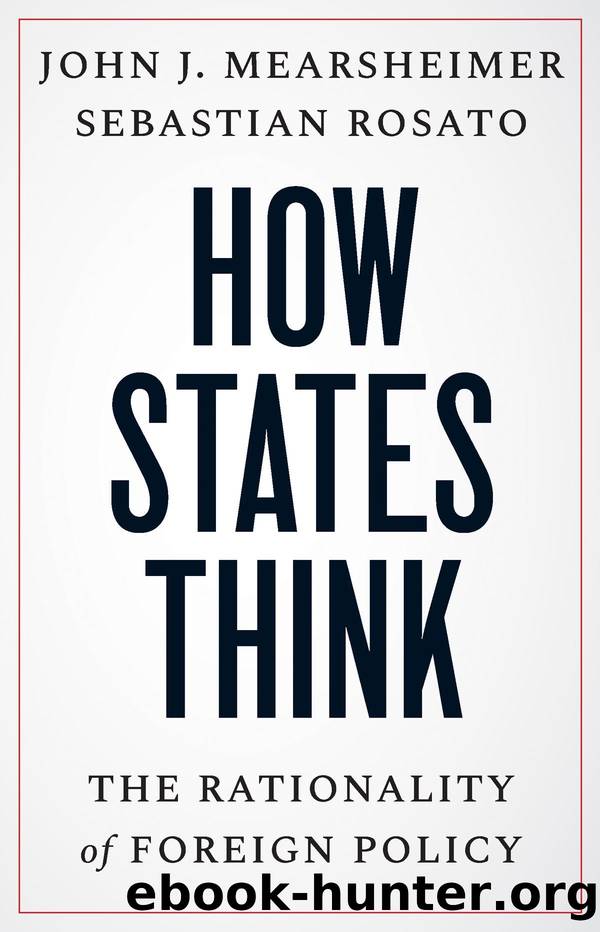How States Think: The Rationality of Foreign Policy by John J. Mearsheimer & Sebastian Rosato

Author:John J. Mearsheimer & Sebastian Rosato [Mearsheimer, John J.]
Language: eng
Format: mobi, azw3
Tags: Economics, International Relations, Diplomacy, Philosophy, Political, History & Theory, General, Political Science, Business & Economics
ISBN: 9780300269307
Publisher: Yale University Press
Published: 2023-01-15T14:27:35.190069+00:00
Japan Decides to Attack the United States at Pearl Harbor
The Japanese decision to attack the United States at Pearl Harbor is often described as a product of nonrational thinking and nondeliberation. Lebow and Stein argue that Japanese decision makers engaged in âwishful thinking,â going to war because they âdeluded themselves that their foe would accept .â.â. defeat instead of fighting to regain the initiative.â23 Snyder also concludes that policymakers in Tokyo were nonrational and that the reason they âfailed to retreat from the precipice is that years of strategic mythmaking had so skewed Japanese perceptions that a clear-sighted appraisal of alternatives had become impossible.â24 Charles Kupchan claims that âthe image equating Japanese security with the establishment of the Co-Prosperity Sphere so imbued the mindset and values of elites that it overrode logic indicating that efforts to realize this notion of security would likely bring ruin to the metropole.â By the time it attacked the United States, Japan âwas not simply seeking resources; it was carrying out a spiritual mission.â Japanese decision makers were driven by âtheir cognitive and emotional commitment to realizing their imperial aspirations.â25 Meanwhile, Jeffrey Record argues that Japanâs choice of war âowed much to Japanese racism, fatalism, imperial arrogance, and cultural ignorance.â Policymakers in Toyko allowed âtheir imperial ambitions to run hopelessly far ahead of their military capacity .â.â. displayed a remarkable incapacity for sound strategic thinking [and] were simultaneously mesmerized by short-term operational opportunities and blind to their likely disastrous long-term strategic consequences.â26
Dale Copeland summarizes this conventional wisdom concerning why Japan decided to attack the United States: âFor most international relations scholars who have delved into this question, the answer is straightforward: Japanese leaders and officials by 1941 were no longer operating in a rational manner. They were filled with a host of irrational beliefs, including the argument that to sustain their vision of empire, they had no other choice but to fight the United States.â27
As for nondeliberation, Robert Jervis emphasizes the shoddy quality of the Japanese decision-making process, quoting Robert Scalapino to make his point: âInstead of examining carefully the likelihood that the war would in fact be a short, decisive one, fought under optimum conditions for Japan, contingency plans increasingly took on a strangely irrational, desperate quality, in which the central issue, âCan we win?,â was shunted aside.â28 Snyder also concludes that the Japanese policy process was nondeliberative, suggesting that âone way this myopia may have arisen was that elites confused each other about the costs and risks of various alternatives by systematically falsifying or withholding information.â29 Van Evera asserts that the Japanese government ânever seriously studied Japanâs chances of winning a war against the United States. It made no overall estimate of Japanâs power and had no master plan for the conduct of the war. It failed to analyze the likely effect of attacking Pearl Harbor on American will to defeat Japan. The Japanese Navy never seriously discussed the implications of its proposed advance into Southeast Asia. .â.â. The Japanese army made no
Download
How States Think: The Rationality of Foreign Policy by John J. Mearsheimer & Sebastian Rosato.azw3
This site does not store any files on its server. We only index and link to content provided by other sites. Please contact the content providers to delete copyright contents if any and email us, we'll remove relevant links or contents immediately.
| Arms Control | Diplomacy |
| Security | Trades & Tariffs |
| Treaties | African |
| Asian | Australian & Oceanian |
| Canadian | Caribbean & Latin American |
| European | Middle Eastern |
| Russian & Former Soviet Union |
The Secret History by Donna Tartt(16664)
The Social Justice Warrior Handbook by Lisa De Pasquale(11494)
Thirteen Reasons Why by Jay Asher(7803)
This Is How You Lose Her by Junot Diaz(5800)
Weapons of Math Destruction by Cathy O'Neil(5048)
Zero to One by Peter Thiel(4836)
The Myth of the Strong Leader by Archie Brown(4796)
Promise Me, Dad by Joe Biden(4459)
Beartown by Fredrik Backman(4435)
Stone's Rules by Roger Stone(4423)
How Democracies Die by Steven Levitsky & Daniel Ziblatt(4415)
The Fire Next Time by James Baldwin(4352)
100 Deadly Skills by Clint Emerson(4086)
A Higher Loyalty: Truth, Lies, and Leadership by James Comey(4041)
Rise and Kill First by Ronen Bergman(4022)
The David Icke Guide to the Global Conspiracy (and how to end it) by David Icke(3892)
The Farm by Tom Rob Smith(3878)
Secrecy World by Jake Bernstein(3790)
The Doomsday Machine by Daniel Ellsberg(3738)
